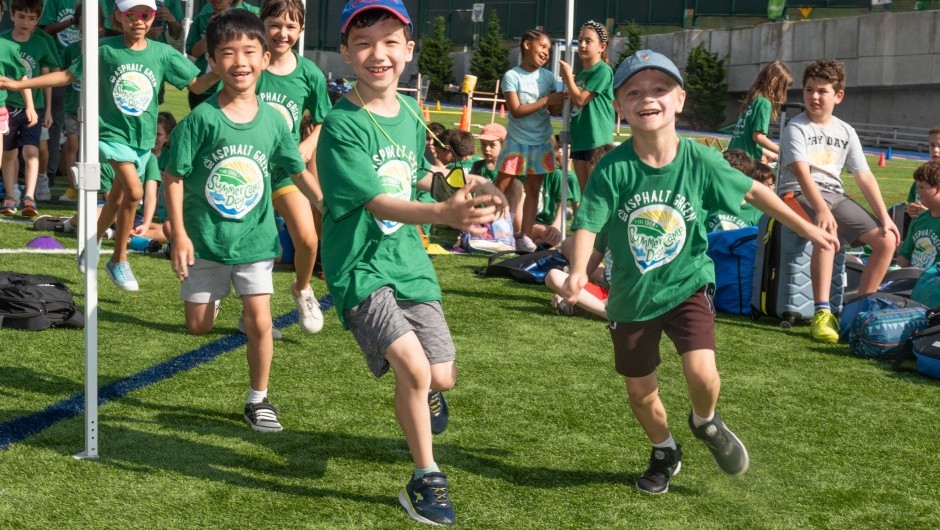At Asphalt Green, providing athletes and fitness enthusiasts of all abilities with access to the highest quality programs is a vital part of our mission.
Our Adaptive Programming department works to ensure our programs adhere to the diverse needs of all our community members. We believe that prioritizing inclusivity and accessibility strengthens our entire community by creating a supportive environment where all our members and athletes can thrive.
Learn more about the programs at each of our campuses:
For a closer look at Asphalt Green’s emphasis on inclusivity in sports, fitness, and play, we sat down with our Director of Adaptive Programs, Lauren Madden.
.jpg)
Can you give us a brief introduction to adaptive programming, and what your role is as Director?
Adaptive Programming at Asphalt Green is all about making sure our programs are inclusive for everyone. We have the privilege of serving a wide range of neighborhoods and communities throughout New York City. In line with our mission to be inclusive, Asphalt Green established the Adaptive Programming department to ensure accessibility for all individuals, regardless of their abilities.
As the Director, my role is to listen to our community—participants, members, staff, and partners. Understanding the needs of our community enables us to effectively fill gaps in programming, ensuring that everyone has access to sports, fitness, and play experiences. My goal is to ensure that everyone who walks through our doors feels welcomed, supported, and empowered to participate fully in our programs. By prioritizing inclusivity initiatives, we foster a community where all individuals can thrive, creating a more supportive environment for all.
Asphalt Green is committed to ensuring athletes of all ages, backgrounds, and abilities have access to the highest-quality athletic programs. Can you explain how adaptive programming fits into our mission?
Adaptive programming aligns seamlessly with Asphalt Green's overarching mission of providing top-tier athletic programs to individuals of all ages, backgrounds, and abilities, a.k,a., “for all,” as it plays a crucial role in ensuring accessibility for neurodivergent and disabled populations, who are often overlooked and underserved in mainstream conversations.
By actively listening to and advocating for the needs of individuals with disabilities, we strive to provide inclusive opportunities that empower everyone to fully participate in our programs. We believe that sports, fitness, and play should be accessible to everyone, and adaptive programming allows us to remove barriers and create environments where every athlete can thrive.
How does adaptive programming benefit the entire sports, fitness, and play community?
Adaptive Programming is a game-changer for the sports, fitness, and play community, because it breaks down barriers and creates opportunities for everyone to get involved. With tailored options that cater to various abilities and needs, Adaptive Programming ensures accessibility and inclusivity across all stages of life. Asphalt Green aims to provide different options and entry points of inclusion to serve the wide range of athletes and participants that exist in New York City.
Adaptive programming and inclusion go beyond just enhancing the experiences of those directly participating in said programs; they also foster deeper understanding, empathy, and acceptance within our broader community. Additionally, by embracing inclusivity, adaptive programming expands the reach and impact of sports, fitness, and play initiatives, creating a more accepting and neuro-affirming world where everyone can thrive.
What are some ways you think the sports, fitness, and play industries can become more inclusive in the years ahead, and how is Asphalt Green providing a blueprint for inclusivity in sports, fitness, and play?
I strongly believe that the sports, fitness, and play industries have the potential to become more inclusive by prioritizing accessibility and creating welcoming spaces for disabled and neurodiverse communities. Oftentimes, inclusive practices are well-intentioned but unsustainable, lacking the long-term planning required to properly serve individuals from different socioeconomic backgrounds at every stage of life.
True inclusion involves meeting people where they are and supporting them in every aspect of their lives. It's not just about programming; it's about fostering an inclusive culture throughout the entire organization. Asphalt Green serves as a blueprint for this approach in New York City, demonstrating that it's possible for a large organization to promote inclusivity by genuinely including and uplifting disabled and neurodivergent individuals as athletes and important members of our community.

